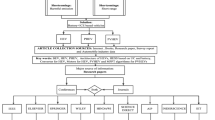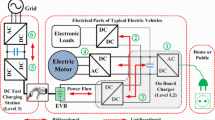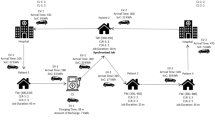Abstract
Compared with real-time control, global optimization has a great advantage to improve the fuel economy due to considering the whole drive condition in advance. However, on-board controller doesn’t support the global optimization with a large amount of calculation. Remote data communicating technology provides a platform to make global optimization applied to on-board control at a pre-known driving cycle. In this paper, a route-based optimal control strategy for the real-time energy management of parallel hybrid electric vehicles is developed. The proposed control strategy employs computers to optimize the power-split and engine stop-start control based on the minimum principle at a predicted driving cycle. Guiding controller provides real-time control with CAN bus communication. The experiment results prove the proposed strategy has a 10% fuel economy improvement than rule-based control strategy.
Similar content being viewed by others
References
Fathy, H. K., Kang, D. and Stein, J. L. (2008). Online vehicle mass estimation using recursive least squares and supervisory data extraction. 2008 American Control Conf., 1842–1848.
Gong, Q., Li, Y. and Peng, Z. R. (2008). Trip-based optimal power management of plug-in hybrid electric vehicles. IEEE Trans. Vehicular Technology 57, 6, 3393–3401.
Kermani, S., Delprat, S., Guerra, T. M., Trigui, R. and Jeanneret, B. (2012). Predictive energy management for hybrid electric vehicle. Control Engineering Practice 20, 4, 408–420.
Keulen, T. V., Mullem, D. V., Jager, B. D., Kessels, J. and Steinbuch, M. (2012). Design, implementation, and experimental validation of optimal power split control for hybrid electric trucks. Control Engineering Practice 20, 5, 547–558.
Lin, C. C., Peng, H., Grizzle, J. W. and Kang, J. M. (2003). Power management strategy for a parallel hybrid electric truck. IEEE Control System Technology 11, 6, 839–849.
Lin, C. C., Peng, H. and Grizzle, J. W. (2004). A stochastic control strategy for hybrid electric vehicles. American Control Conf., Proc., 5, 4710–4715.
Long, V. T. and Nhan, N. V. (2012). Bees-algorithm-based optimization of component and control strategy parameters for parallel hybrid electric vehicles. Int. J. Automotive Technology 13, 7, 1177–1183.
Montazeri-Gh, M., Poursamad, A. and Ghalichi, B. (2006). Application of genetic algorithm for optimization of control strategy in parallel hybrid electric vehicles. J. Franklin Institute 343, 4–5, 420–435.
Paganeli, G., Guerra, T. M., Delprat, S., Santin, J. J., Delhom, M. and Combes, E. (2000). Simulation and assessment of power control strategies for a parallel hybrid car. IEEE J. Automobile Engineering, IMechE 214, 7, 705–718.
Park, J. and Park, J. H. (2012). Development of equivalent fuel consumption minimization strategy for hybrid electric vehicle. Int. J. Automotive Technology 13, 5, 835–843.
Perez, L. V. and Pilotta, E. A. (2009). Optimal power split in a hybrid electric vehicle using direct transcription of an optimal control problem. Mathematics and Computers in Simulation 79, 6, 1959–1970.
Sahlholm, P. and Johansson, K. H. (2010). Road grade estimation for look-ahead vehicle control using multiple measurement runs. Control Engineering Practice 18, 11, 1328–1341.
Salmasi, F. R. (2007). Control strategy for hybrid electric vehicles: Evolution, classification, comparison, and future trends. IEEE Trans. Vehicle Technology 56, 5, 2393–2404.
Vahidi, A., Stefanopoulou, A. and Peng, H. (2005). Recursive least squares with forgetting for online estimation of vehicle mass and road grade: Theory and experiments. Vehicle System Dynamics 43, 1, 31–55.
Varnhagen, R. and Korthaus, C. (2010). Reduction of fuel consumption with intelligent use of navigation. SAE Paper No. 2010-01-2004.
Yu, S. E., Ohn, H. S. and Min, K. D. (2013). Investigation of engine restart stability after idle stop for a mild type HEV powertrain. Int. J. Automotive Technology 14, 5, 683–692.
Author information
Authors and Affiliations
Corresponding author
Rights and permissions
About this article
Cite this article
Yan, B., Hu, Y.Q., Yan, T. et al. Route-based adaptive optimization for energy management of hybrid electric vehicles. Int.J Automot. Technol. 15, 1175–1182 (2014). https://doi.org/10.1007/s12239-014-0122-7
Received:
Revised:
Accepted:
Published:
Issue Date:
DOI: https://doi.org/10.1007/s12239-014-0122-7




